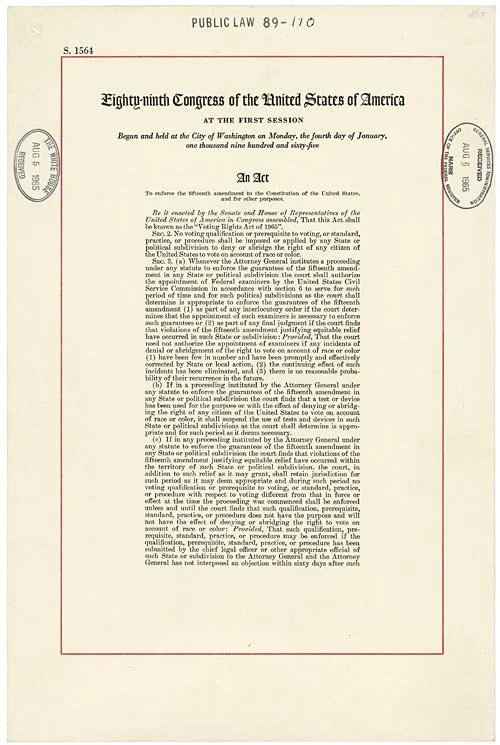Why South Asians Should Vote
The Urgent Need for South Asians to Register to Vote
The right to vote was hard-won through years of struggle and advocacy by those who came before us.
Yet today, despite being the fastest-growing community in Texas, only about 60% of South Asians are registered to vote. This gap is a missed opportunity to honor their legacy and assert our collective power.
We need to make voter registration a central part of the strength we're building as a community. Each vote we cast is a statement of our presence and our influence. By registering and voting, we ensure that our voices are heard and our needs are addressed.
Don’t let our progress stall. Register to vote today and encourage others to do the same. Together, we can make a powerful impact and continue the fight for our rightful place in the democratic process.
From the 1965 Voting Rights Act to Today
The journey of South Asians in the United States is one of resilience, perseverance, and triumph. It wasn’t that long ago when we, as a community, were fighting for the basic right to vote—a right that many of us now take for granted. The Voting Rights Act of 1965 was a landmark moment, not just for African Americans but for all minority communities, including South Asians. This act dismantled barriers that had long suppressed our voices, and it laid the foundation for the vibrant, growing community we are today.
A Brief History: The Struggle for Voting Rights
The 1965 Voting Rights Act was a pivotal law in the civil rights movement. It aimed to overcome the systemic racism that prevented minorities from exercising their right to vote. Before this, discriminatory practices like literacy tests, poll taxes, and outright intimidation were common, especially in the South. Although South Asians were a smaller community at the time, the broader fight for civil rights paved the way for all marginalized groups to gain equal access to the ballot box.
For South Asians, the struggle for voting rights was also intertwined with immigration laws. The Immigration and Nationality Act of 1965, which followed the Voting Rights Act, abolished the discriminatory national origins quota system, allowing more South Asians to immigrate to the U.S. As our community grew, so did our stake in the American democratic process.
Our journey in America began humbly. Many of the earliest South Asians arrived as indentured servants, working on farms and in other labor-intensive industries. Slowly, we transitioned to becoming professionals and business owners, establishing ourselves in various sectors. Despite our growing numbers, we remained a small, often overlooked community, with few people understanding how to engage us in the civic space.
From a Small Community to the Fastest-Growing in Texas
Fast forward to today, and South Asians are no longer a small, overlooked community. The largest wave of South Asian immigration came during the tech boom of the 1990s, bringing in a new generation of skilled professionals. Since then, we have become the fastest-growing ethnic group in Texas, contributing significantly to the state’s economy, culture, and political landscape. Our presence is felt in every major city, from Houston to Dallas to Austin.
But with growth comes responsibility. As our community expands, so does our influence. Voting is the most direct way to ensure that our voices are heard, our needs are met, and our rights are protected. It’s not just about participating in a civic duty; it’s about shaping the future of Texas and the country as a whole.
Why Voting Matters Now More Than Ever
In today’s political climate, our votes can make a decisive difference in key races. Issues that directly affect our community—such as immigration policies, education funding, healthcare access, and economic opportunities—are all on the line. By voting, we can elect leaders who understand our concerns and will work to address them.
Moreover, the act of voting is a powerful statement. It says that we belong here, that our voices matter, and that we are invested in the future of this state and country. It’s a way to honor the struggles of those who fought for our right to vote and to pave the way for future generations of South Asians in America.
Building Our Collective Power
The story of South Asians in Texas is one of growth and empowerment. From the days of the 1965 Voting Rights Act to today, we have come a long way. But the journey is far from over. As we continue to grow, so does our ability to influence the direction of this state and nation.
Why South Asians Should Vote
Voting is not just a right; it's a powerful tool that shapes our future. As South Asians, we have a unique opportunity to make a significant impact in Texas and beyond. Our community has grown from a small, often overlooked group to one of the fastest-growing communities in the state. With this growth comes the responsibility to ensure our voices are heard and our interests are represented.
When we vote, we are not just participating in a civic duty—we are asserting our place in this country. We are making sure that our concerns about immigration, education, healthcare, and economic opportunities are addressed by those in power. We are honoring the legacy of those who fought for our right to vote and paving the way for future generations.
Now, more than ever, it's crucial for South Asians to vote. Our votes can sway elections, influence policy decisions, and ensure that our community's needs are front and center. By coming together and voting, we build our collective power and secure a future that reflects our values and aspirations.
Let’s make sure that our voices are heard in every election. Register, vote, and encourage others to do the same. Together, we can shape a future where South Asians are fully represented and respected in the democratic process.


